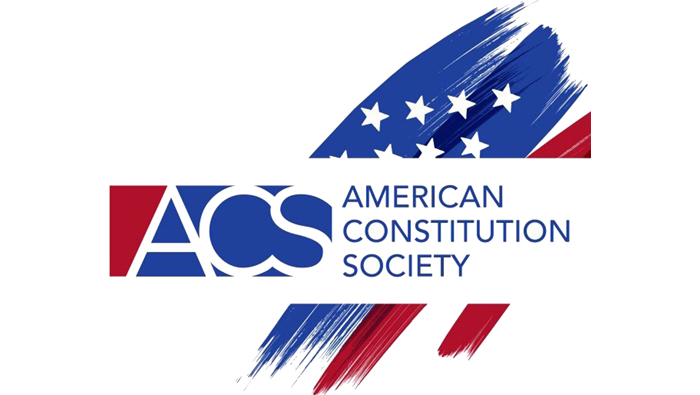American Constitution Society
American Constitution Society is a non-partisan, non-profit, educational association. We aim to revitalize and transform the legal and policy debates occurring in law school classrooms, federal and state courtrooms, legislative hearing rooms, and the media. We are working every day to advance a progressive vision of the law on issues across the policy spectrum.
-
Contact the American Constitution Society
For more information, contact lawstudentservices@udmercy.edu.
- Aman McLeod: Faculty Advisor
Instagram: @acsdetroitmercy
-
Solidarity Letter
An Open Letter from Detroit Mercy Law’s American Constitution Society:
The mission of the American Constitution Society is to harness the values of compassion and respect for each individual, and to re-incorporate them into American law and politics, in order to build a stronger and more decent national community. We seek to restore the fundamental principles of respect for human dignity, protection of individual rights and liberties, genuine equality, and access to justice to their rightful place in American law. We want to strengthen the intellectual underpinnings of a vision of the law in which these values are paramount. Our goal is a rekindling of the hope that by reason and decency, we can create an America that is better for us all.
We are grieving over the systemic and senseless losses of life to state sanctioned murder, and we stand with our Black and Brown communities in solidarity. And while it is important to grieve, we must also be a part of the change that is so desperately needed. The widespread protests following the death of George Floyd have quickly given rise to a vast American reckoning with its longstanding racism and entrenched inequality as protestors continue to demand racial justice and accountability. Without justice, there can be no peace. As future legal advocates, we must use our voice to demand social and structural change.
We are demanding to hold officers accountable for their heinous actions. After countless nationally publicized incidents of police brutality, it is time to hold government officials to the same standard of legal conduct as citizens—if you break the law, you will be liable. Qualified immunity has been a significant barrier to rectifying constitutional violations in the justice system. The Supreme Court announced it would decline to hear cases on qualified immunity, and so the fate of the doctrine is left to Congress.
We are disturbed by the unfolding threat to the First Amendment right to speak freely and advocate for social change. We have seen protesters get tear gassed, arrested, and beaten by officers hired to protect them while they expressed themselves in a way that the First Amendment guarantees them the right to—peacefully and legally. The right to protest is a manifestation of the freedom to assemble, freedom to associate, and freedom of speech—all critical components of a functioning democracy. It is crucial that we recognize these injustices and help protect the rights of our communities to stand together and demand action from our elected officials. That to protest police brutality, we must endure police brutality is not lost.
As future lawyers fighting for our democracy and the Constitution to protect the rights, humanity, and dignity for all people, we have a lot of work to do. We encourage our fellow student leaders to use their organizations as a platform to bring attention to systemic and institutional racism, highlight work being done on a local, state, and national level to dismantle structures of oppression, and lift up the voices of Black Americans. Here are some ideas for how to do so:
- Lift Up Diverse Voices. Work to consciously elevate the voices of people of color in our communities and pursue a more inclusive professional culture.
- Lift Up Community Work. Recognize local community leaders when you think about who should weigh in on any given topic—they are the ones doing the groundwork and driving change in our communities.
- Plan Conscious Programming. Think about the events you want to hold in the upcoming year and consider how they can contribute to further exposing structural racism.
- Have a Diversity and Inclusion Chair on your Executive Board. Ensure that your programming is inclusive and holistic, that your programming includes diverse speakers, that your student leadership and membership are diverse, and that your organization regularly collaborates with diverse organizations.
- Ask your Congressional Representatives to Support Ending Qualified Immunity. Hold officers accountable for their actions, provide the victims of brutality with a remedy in the court systems, and mitigate the occurrence of police brutality in the future.
- Advocate for an End to the Systems That Have Allowed Harm to Marginalized Communities. Speak out and stand in solidarity with your communities in all different forms—marching, reading, and writing or signing petitions, etc. The power of the people can be a potent political force to implement change. Demonstrations of support for a cause or opposition to a policy or government have changed the course of our history.
- Vote for Leaders That Will Better Our Society, Speak Truth to Power, and Help Create a More Just World. Register to vote and make informed decisions in local, state, and national elections. Participating in the democratic process is one of the most important privileges U.S. Citizens have. Young people account for half of the voting population and can directly influence the issues that will affect our lives for years to come. When we all vote, we determine the trajectory of this country and what it will be in the future.
The work that connects us is firmly rooted in a belief that democracy can and must work for the people. We take that charge seriously, and we call on our fellow classmates to stand up against the terror and injustice of racism.
“Justice will never come if we only do the things that are comfortable. More people have to be willing to do that uncomfortable, inconvenient thing that justice requires for things to get better.”
—Bryan Stevenson
In Solidarity,
2020-2021 Detroit Mercy Law American Constitution Society
President, Nara Gonczigsuren
Vice President, Nichole Omilion
Treasurer, Dylan Dahring
Secretary, Aidan Traynor
3L Representative, Kaycee Berente
2L Representative, Allen Vinson

